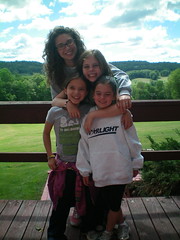By now you probably have a pretty good idea about what life is like for campers at summer camps, but there is an entirely different world behind the scenes of summer — the life of a camp counselor. Imagine a job where you can make new friends, participate in fun summer activities and have unique opportunities for personal growth and development. Indeed, being a camp counselor might just be “the last throwback job. » It’s intense, it’s 24-7, and there are few jobs like it for young adults.
 A camp counselor’s day begins bright and early, when the campers wake up. They get up with the kids, get dressed, share breakfast together and motivate the campers to start their day. Cabin counselors for the youngest campers (grades 1-5) stay with them throughout the day, like a big brother or sister, ushering them through their daily routine of activities, meals and field trips. Campers develop close relationships with their counselors over the summer, and the counselors take on the roles of surrogate parent, mentor, leader, role model, and friend. The counselors work hard to maintain a great relationship with campers (Read more here about the training counselors receive.)
A camp counselor’s day begins bright and early, when the campers wake up. They get up with the kids, get dressed, share breakfast together and motivate the campers to start their day. Cabin counselors for the youngest campers (grades 1-5) stay with them throughout the day, like a big brother or sister, ushering them through their daily routine of activities, meals and field trips. Campers develop close relationships with their counselors over the summer, and the counselors take on the roles of surrogate parent, mentor, leader, role model, and friend. The counselors work hard to maintain a great relationship with campers (Read more here about the training counselors receive.)
While counselors have fun and get to participate in camp activities, they also have a tremendous amount of responsibility. “I learned to be a leader as a camp counselor,” Disney CEO Michael Eisner told Charlie Rose in a 2005 interview. In his memoir, simply titled Camp, Eisner reminisces about his many summers as a camper and then counselor. In the corporate world, Eisner says, no one is willing to give you real responsibility until you are in your 30s or even in your 40s. At camp, that opportunity comes much earlier and the payoff is huge.
David Knee, a counselor at Starlight who runs the camp’s counselor-in-transition program, couldn’t agree with Eisner more. “The position of counselor provides you with learning far beyond camp. It transcends camp to enable you to conduct yourself as a professional in any environment through community service, care for others, and the development of pedagogy, training skills, etc.”
 Knee began his camping career as a camper 14 years ago. He is now the person responsible for building the counselor-in-transition program – grooming the eldest campers to be the counselors of tomorrow. Regardless of what camp your child attends, if they are interested in one day being a counselor, they will probably need to complete some sort of transition program like the one David runs at Starlight.
Knee began his camping career as a camper 14 years ago. He is now the person responsible for building the counselor-in-transition program – grooming the eldest campers to be the counselors of tomorrow. Regardless of what camp your child attends, if they are interested in one day being a counselor, they will probably need to complete some sort of transition program like the one David runs at Starlight.
Starlight’s program takes two years and after this training, CAs are eligible for staff positions. Camp Starlight’s “Counselor Apprentices” are usually 15 or 16 years old, and they receive specialized training as well as mentoring from current counselors, whom they shadow. “They are observing and instructing at the same time,” Knee says of the CA’s dual role as trainee and counselor. An important part of the CA training program is letting the CAs see the “backstage process” of camp, Knee says. Even campers who have attended the same camp for years don’t see all the hard work it takes to make camp great. So Starlight’s program begins right after campers’ “senior summer” at camp and includes a bus trip down the California coast just after visiting day for the group.
Through such transition programs and experiences, counselors can grow and flourish in the leadership roles they are given and prove themselves capable before and during high school, not just after they graduate. But the lessons learned at camp also provide excellent tie-ins to other careers that involve working with children, including teaching, coaching, and social work; not to mention careers in business, management and administration. Being a counselor demands highly refined interpersonal, time management and training skills — assets for any career and in any profession.
Take a look around – you might be surprised how many former counselors are in your world!
Susan


 570-798-9831
570-798-9831